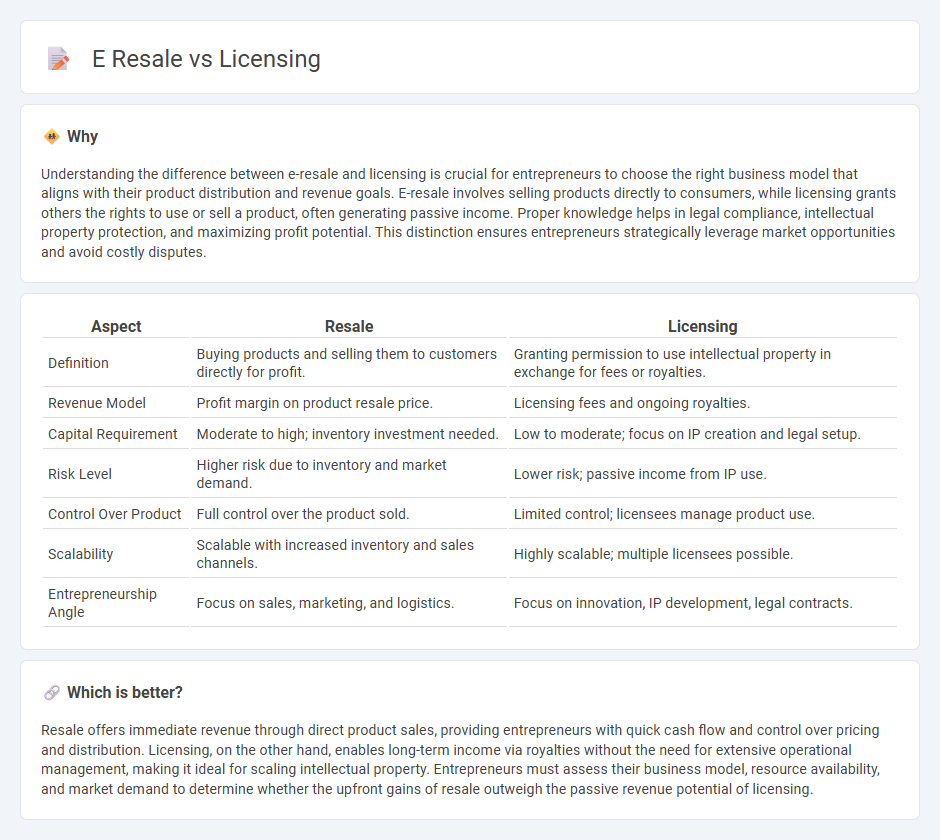
E-resale involves the online buying and selling of goods, allowing entrepreneurs to leverage digital marketplaces to reach a broad audience quickly and cost-effectively. Licensing permits a business to grant rights to another party to use its intellectual property, enabling passive income streams without the complexities of direct sales. Explore in-depth differences between e-resale and licensing to determine the best strategy for your entrepreneurial goals.
Why it is important
Understanding the difference between e-resale and licensing is crucial for entrepreneurs to choose the right business model that aligns with their product distribution and revenue goals. E-resale involves selling products directly to consumers, while licensing grants others the rights to use or sell a product, often generating passive income. Proper knowledge helps in legal compliance, intellectual property protection, and maximizing profit potential. This distinction ensures entrepreneurs strategically leverage market opportunities and avoid costly disputes.
Comparison Table
| Aspect | Resale | Licensing |
|---|---|---|
| Definition | Buying products and selling them to customers directly for profit. | Granting permission to use intellectual property in exchange for fees or royalties. |
| Revenue Model | Profit margin on product resale price. | Licensing fees and ongoing royalties. |
| Capital Requirement | Moderate to high; inventory investment needed. | Low to moderate; focus on IP creation and legal setup. |
| Risk Level | Higher risk due to inventory and market demand. | Lower risk; passive income from IP use. |
| Control Over Product | Full control over the product sold. | Limited control; licensees manage product use. |
| Scalability | Scalable with increased inventory and sales channels. | Highly scalable; multiple licensees possible. |
| Entrepreneurship Angle | Focus on sales, marketing, and logistics. | Focus on innovation, IP development, legal contracts. |
Which is better?
Resale offers immediate revenue through direct product sales, providing entrepreneurs with quick cash flow and control over pricing and distribution. Licensing, on the other hand, enables long-term income via royalties without the need for extensive operational management, making it ideal for scaling intellectual property. Entrepreneurs must assess their business model, resource availability, and market demand to determine whether the upfront gains of resale outweigh the passive revenue potential of licensing.
Connection
E-resale involves the digital buying and selling of products or services, while licensing grants permission to use intellectual property or brand rights. These concepts intersect when licensed products are resold online, enabling entrepreneurs to leverage brand value without manufacturing goods. This connection fosters scalable business models by combining digital marketplaces with intellectual property rights management.
Key Terms
Intellectual Property
Licensing grants permission to use intellectual property under specific terms while ownership remains with the licensor, enabling control over distribution and usage rights. E-resale involves the online selling of licensed digital goods, where licensors must ensure transferability clauses to maintain IP protection and prevent unauthorized reproduction. Explore in-depth differences to optimize your IP strategy effectively.
Royalty Fees
Royalty fees for licensing agreements typically involve ongoing payments based on sales or usage, providing licensors a steady revenue stream without transferring ownership. In contrast, e-resale often requires a one-time purchase or a fixed fee, limiting long-term royalty income but offering immediate payment and simplified rights management. Discover the detailed financial implications and strategic benefits of each model to optimize your intellectual property revenue.
Distribution Rights
Licensing grants third parties the right to distribute content under specific terms, often restricting geographic regions or platforms to protect the original creator's control and revenue streams. E-resale involves the transfer or sale of digital goods, occasionally challenging distribution rights due to ownership complexities and potential copyright issues. Explore the nuances of distribution rights in licensing and e-resale to optimize content monetization strategies.
Source and External Links
What is Licensing | Licensing International - Licensing is an agreement where a licensee leases rights to intellectual property from a licensor, used across many industries such as entertainment, sports, fashion, and corporate brands, serving as a marketing and brand extension tool.
Apply for a New License - NIPR - To apply for a new license, applicants must provide identification information such as a license number or social security number, pay fees electronically, and comply with specific state regulations depending on resident or non-resident status.
Professional Licensing in Illinois - IDFPR - The Illinois Department of Financial and Professional Regulation reviews applications for professional licenses, issues deficiency notices if needed, and handles denial processes related to criminal background or disciplinary concerns.
 dowidth.com
dowidth.com